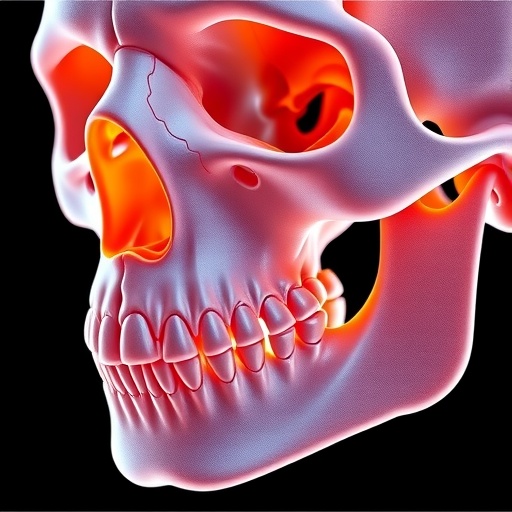Recent scientific advancements have unveiled a groundbreaking study focusing on the therapeutic potential of adipose-derived stem cell (ADSC) enriched extracts in the treatment of temporomandibular joint (TMJ) osteoarthritis. The research, conducted by a team of esteemed scientists led by Zhang et al., accentuates a novel approach to mitigating cartilage fibrosis, which is a significant contributor to TMJ dysfunction and associated pain. The study highlights how these extracts can notably inhibit the senescence of chondrocytes, offering a promising avenue for enhancing joint health.
TMJ osteoarthritis is a degenerative condition characterized by the gradual erosion of cartilage, leading to severe discomfort, restricted movement, and long-term disability. The temporomandibular joint plays a crucial role in everyday activities such as chewing and speaking, making its health pivotal for quality of life. Traditional treatments for TMJ disorders range from conservative approaches, like physical therapy and pain management, to surgical interventions. However, these methods often fall short of addressing the underlying biological mechanisms, such as cartilage degradation and cellular aging within the joint.
Zhang and colleagues have positioned their research at the intersection of regenerative medicine and osteoarthritis treatment. Their examination of ADSC-enriched adipose extracts unfolds the intricate interactions between stem cells and cartilage cells. By isolating and characterizing these extracts, the team has demonstrated their unique ability to modulate the cellular environment within the joint, counteracting the adverse effects of aging and degeneration in chondrocytes.
The study’s methodology involved comprehensive in vitro and in vivo experiments aimed at elucidating the effects of ADSC extracts on chondrocyte populations. These investigations revealed a striking capacity of the extracts to delay the senescence of these essential cells. Chondrocyte senescence is known to contribute to the development of fibrosis and the overall decline in cartilage health. By inhibiting this process, ADSC extracts pave the way for improved extracellular matrix production and enhanced cartilage resilience.
One of the most compelling findings of this research is the anti-fibrotic properties of ADSC-enriched extracts. Fibrosis, characterized by an excessive accumulation of collagen and other extracellular matrix components, leads to stiffness and reduced functionality of the joint. The extracts appear to reverse or prevent this fibrotic process, fostering a more favorable microenvironment for cell repair and growth. This remarkable capability positions ADSC extracts as a valuable ally in the battle against TMJ osteoarthritis.
Furthermore, the immunomodulatory effects of these extracts signify another layer of therapeutic potential. The team observed that ADSC extracts not only promote chondrocyte health but also modulate the inflammatory response typical of osteoarthritis. By addressing inflammation, the extracts contribute to reducing pain and promoting healing in the affected joint structures. This dual action of mitigating both fibrosis and inflammation could redefine treatment protocols for TMJ disorders.
The significance of this research extends beyond immediate clinical applications; it poses profound implications for the future of regenerative therapies. As evidence mounts regarding the efficacy of stem cell-derived products, the possibility of creating standardized treatments for osteoarthritis becomes increasingly attainable. This study sets a precedent for future investigations aiming to harness the regenerative capabilities of stem cells in a clinical setting.
Equally important is the accessibility and versatility of ADSC-enriched extracts. Obtaining adipose tissue is minimally invasive compared to other tissue harvesting techniques. This accessibility increases the likelihood of widespread adoption of this treatment, especially for patients who are currently facing the limitations of traditional osteoarthritis therapies. The potential to utilize a patient’s own adipose tissue enhances the safety profile of this approach while minimizing the risk of adverse reactions.
As the scientific community anticipates further advancements in this field, the necessity of rigorous clinical trials cannot be overstated. While the initial findings are promising, robust trials that demonstrate efficacy and safety across diverse populations will be crucial in translating these laboratory results into clinical practice. Collaboration among clinicians, researchers, and regulatory bodies will be essential in navigating the path from bench to bedside.
This research is a pivotal moment in our understanding of osteoarthritis — particularly TMJ osteoarthritis. It emphasizes the need for innovative, patient-centered approaches that address the complexities of degenerative joint diseases. The exploration of ADSC-enriched adipose extracts could open new doors in regenerative medicine, offering hope not just for TMJ disorders but for similar conditions affecting other joints throughout the body.
In conclusion, Zhang et al.’s study is a seminal contribution to the field of regenerative medicine and osteoarthritis treatment. As researchers continue to delve into the mechanisms underpinning cartilage health, the integration of stem cell-derived therapies into osteoarthritis management appears both promising and necessary. The findings advocate for continued investment in innovative therapeutic strategies, which could ultimately lead to enhanced patient outcomes and a better quality of life for those suffering from degenerative joint diseases.
The journey towards adopting these findings into clinical practice will require a unified effort to ensure that patients benefit from these speedy developments in science. Researchers, healthcare providers, and policymakers must collaborate to facilitate the necessary clinical trials and legal pathways, ensuring that innovative treatments such as ADSC-enriched extracts transition smoothly from laboratory studies to accessible therapies for those in need.
As we stand on the cusp of a potential revolution in osteoarthritis treatment, it is vital to keep patient welfare at the forefront of scientific exploration. The future of joint health may very well lie in the transformative power of stem cells, ushering in new hope for millions grappling with the pain and limitations of osteoarthritis.
Subject of Research: Treatment of temporomandibular joint osteoarthritis using ADSC-enriched adipose extracts.
Article Title: ADSC-enriched adipose extract alleviates cartilage fibrosis in temporomandibular joint osteoarthritis by inhibiting chondrocyte senescence.
Article References:
Zhang, Z., Jin, D., Jing, B. et al. ADSC-enriched adipose extract alleviates cartilage fibrosis in temporomandibular joint osteoarthritis by inhibiting chondrocyte senescence.
J Transl Med 23, 1072 (2025). https://doi.org/10.1186/s12967-025-07108-8
Image Credits: AI Generated
DOI:
Keywords: Osteoarthritis, Temporomandibular Joint, Adipose-Derived Stem Cells, Chondrocyte Senescence, Cartilage Fibrosis
Tags: adipose-derived stem cellsADSC enriched extractscartilage degradation solutionscartilage fibrosis mitigationcellular aging in jointschondrocyte senescence inhibitionjoint health enhancementnon-surgical TMJ therapiesosteoarthritis research advancementsregenerative medicine for TMJtemporomandibular joint dysfunction managementTMJ osteoarthritis treatment





